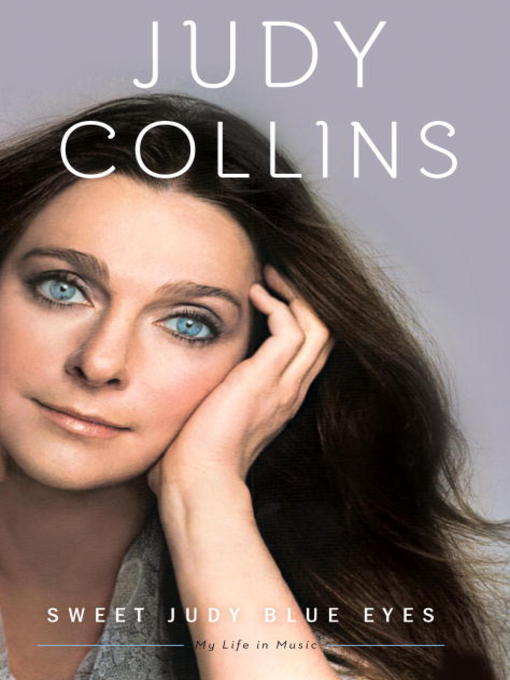
Sweet Judy Blue Eyes
My Life in Music
کتاب های مرتبط
- اطلاعات
- نقد و بررسی
- دیدگاه کاربران
نقد و بررسی

Starred review from August 22, 2011
Collins’s improbable and utterly charming tale of assuming iconic status as a popular music star from the early 1960s’ onward also proves a tremendously valuable chronicle of the early folk music scene. Collins was there, rather accidentally: she was a classical pianist who had largely grown up in Denver, Colo., to a blind, hard-drinking father who read Dylan Thomas in Braille and hosted a radio literary program; she was married and with a young child when her husband suggested that she get a job at Michael’s Pub in Boulder singing the folk songs she loved. Steeped in the work of Jo Stafford and Elton Hayes, later songs by Woody Guthrie and Pete Seeger, Collins was a natural troubadour of traditional ballads like “The Gypsy Rover” and “Maid of Constant Sorrow” and gradually made a name for herself on the circuit, like the Gate of Horn in Chicago and Gerde’s Folk City in Greenwich Village; she secured a long-running record deal with Elektra by 1961, when she was 22. Her memoir portrays the now legendary talent she rubbed shoulders with, especially songwriters like Joni Mitchell, Stephen Stills, and Leonard Cohen, and captures a time in the musical scene replete with experimental drugs and sex, while her encroaching alcoholism stalks her story darkly. By 1978, when she concludes in this forthright, radiant work, she had made scores of records—and quit drinking to save her life.

September 1, 2011
Famed folk singer's candid memoir about her survival in the music business despite a 20-year battle with booze.
Although classically trained folkie Collins (Singing Lessons, 1998, etc.) may exude an angelic veneer of ivory-snow purity and Midwestern conservatism, this memoir should dispel any remaining air of innocence surrounding the woman who made Stephen Sondheim's saccharine "Send In the Clowns" a top-10 hit. Collins was raised in a middle-class family in Colorado at the beginning of World War II. Her father was a blind radio personality with some modicum of notoriety. However, he was also a depression-prone alcoholic whose addictive personality got passed down to his musician daughter with full potency. Although this is as booze-soaked a memoir as any rock star could hope to write, Collins provides a panoramic view of a politically turbulent but creatively explosive bygone era. Along with telling the story of her own rise to prominence in the mid-'60s New York City folk scene, the author also places her life in its broader historical context. Readers will get a keen sense of the tenor of the times as Collins repopulates the Greenwich Village streets with all the vibrant characters and long-vanished performance venues that helped make that neighborhood famous. Though she married young, Collins soon became something of a notorious serial monogamist, zipping from one partner to another with striking frequency, even for the free-love generation: Collins shared a bed with everyone from an English professor to rock star Stephen Stills. Although the author is refreshingly forthcoming about her promiscuity, she never spends much time second-guessing her frequent and sometimes overlapping relationships with men. Up through her popular mainstream success in the '70s, Collins continued her struggle with alcohol addiction and fragmented relationships until around 1978, when she finally found some grounding in her life.
Despite Collins' tendency to lapse into high-toned idealism and compulsive name-dropping, this is a fascinating and even harrowing musical and personal reflection.
(COPYRIGHT (2011) KIRKUS REVIEWS/NIELSEN BUSINESS MEDIA, INC. ALL RIGHTS RESERVED.)

September 1, 2011
To the casual observer, Judy Collins projects a particular image: a sweet-tempered, crystal-clear warbler who earned her fame by singing other people's songs (Joni Mitchell's Both Sides Now) and, improbably, had a huge international hit with an old hymn written by the captain of a slave ship (Amazing Grace). In this candid yet tastefully restrained memoir, Collins reveals her problems with alcohol, her marital woes, and her struggles with depression, anxiety attacks, and migraine headaches. But there are also plenty of music anecdotes. She recalls the first time she heard folk music, as a teenager in Colorado, a traditional ballad called The Gypsy Rover (I knew at once it was meant for me); being a part of the Greenwich Village folk scene; and the heady days in 1968, when she met and fell in love with musician Stephen Stills in Los Angeles (Everything about L.A. in those days was romantic. It was the rocking place to be). It was Stills, of course, who, as part of Crosby, Stills & Nash, would immortalize her in the song Suite: Judy Blue Eyes.(Reprinted with permission of Booklist, copyright 2011, American Library Association.)

























دیدگاه کاربران